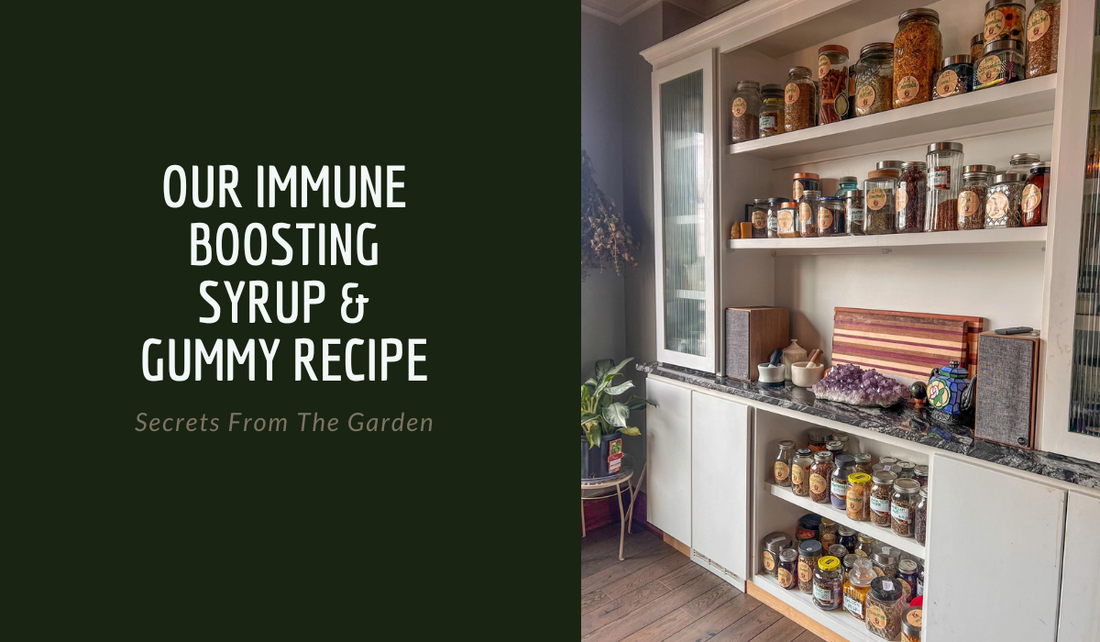
Our Immune Boosting Syrup, plus Gummies!

As the seasons change and temperatures drop, our immune systems can use a little extra support. We all know the foundation to a strong, and resilant immune system requires; adequte sleep, stress management, exercise, and a diet rich in protein, polyphenols, antioxidants, and complex fermented carbs. These nutrients synergestically work together to keep our gut-flora in balance, which is where 90% of our immune cells are held.
Unfortunatley, due to a number of factors, such as; poor diet, stress, trauma, lack of sleep, and lack of sunlight may all cause physical manifestations of cold and flu like symptoms.
That's where elderberry syrup comes in – a natural, effective, and delicious way to boost our body's natural defenses. Elderberry syrup is easy to make at home, and truthfully a fun and easy recipe to make with kids. Get creative, add your own herbs, and spices. Our family keeps elderberry syrup, or gummies, in the fridge-- from Autumn Equinox until Spring Equinox.
What is Elderberry Syrup?
Elderberry syrup is made from the berries of the Sambucus nigra plant, packed with antioxidants, flavonoids and anthocyanins. Research suggests these compounds may nourish and support the immune system.
Benefits of Elderberry Syrup
Immune System Support
Research suggests that elderberry contains compounds that are anti-viral, anti-inflammatory, while being abundant in micro and macro nutrients, not to mention the high antioxidant content. Antioxidants work to fight free radicals that damage DNA, and may contribute to reoccuring illnesses.
Cold and Flu Relief
Studies demonstrate elderberry's efficacy in reducing severity and duration of cold and flu symptoms. In this study, a randomized, double blind study was conducted, with air travelers, 158 people in the elderberry group and 154 people were assigned to the placebo group. The placebo group had a collective duration of 117 episode days; in comparison, the elderberry group had a significantly lower number of cold episode days (57, p = 0.05) (Figure 3A). Moreover, the symptom score in the placebo group over these days was 583, whereas in the elderberry group it was 247 (Figure 3B). The difference in symptom score between both groups was also significant (p = 0.02). Meaning elderberry may shorten the duration of the illness, and inhibit symptoms of the illness itself.

Antioxidant Properties
Antioxidants combat free radicals. Free radicals are "unstable molecules" that damage our cells and our DNA. Consuming antioxidants regularly may support a strong a resilant immune system, and terrain all year long.
Anti-Inflammatory Effects
Research suggests that Elderberry's flavonoids and anthocyanins may work to combat and reduce inflammation when consumed regularly; especially before travel, or during "cold and flu season".
How to use Elderberry syrup
1. Adults take 1 tbsp 3-4x weekly as a proactive measure. When traveling, sick, or exposed to illness, (school teachers, healthcare workers especially) take 2 tbsps every two hours. Children (ages 1 and up): 1 tsp 3-4x weekly as a proactive measure, when exposed to illness 1 tsp - 1 tbsp every two hours. Get creative Mix with water or juice for a refreshing drink. 3. Add to tea or smoothies. Or turn that syrup into elderberry gummies!





2 comments
Great question, Kathy. The shelf life of the elderberry gummy can differ depending on storage of the gummy and if sugar or honey was used in the making of the elderberry syrup, before it was turned into a gummy. I have found that elderberry syrup made with sugar lasts longer and therefore when adding gelatin to make the gummy— the gummy ends up lasting longer, usually about 4-6 weeks in the fridge. I have never had an elderberry gummy made with honey last longer than 2-3 weeks in the fridge. I hope that helps. :)
How long are the gummies good for, the syrup says 4 weeks in fridge, is it the same?